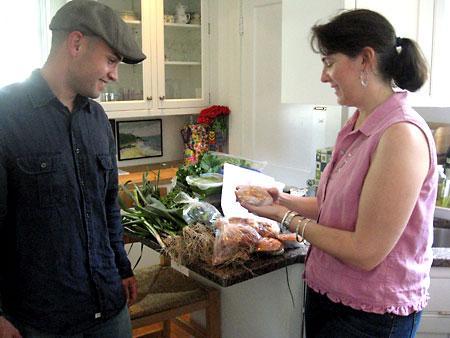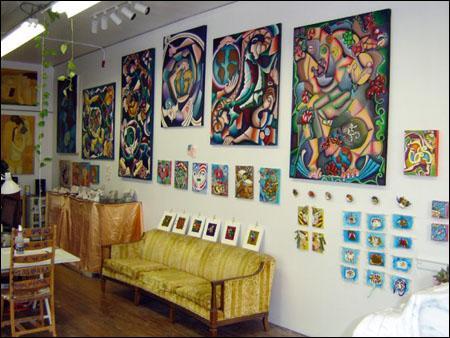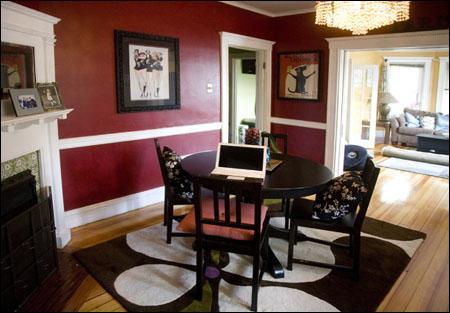Advertisement
Will Trade For Food — Cashless Economies On The Rise

Valerie Gates will work for food. She does it all the time. Standing in her Wellesley kitchen, the marketing expert, who doesn't cook much, reaps the harvest of a barter system she devised five months ago.
The ancient form of exchange is making a comeback during this economic downturn. People and businesses are bartering services and stuff: piano lessons, plumbing, accounting, dining-room sets — even asparagus.
Salad greens and herbs spill onto Gates' counter top, thanks to Jake Ferreira. Gates fashioned a logo for his fledgling farming company, Beetlebung Farm LLC. Ferreira and his business partner help people and schools build vegetable gardens on Martha's Vineyard. They also cater using local ingredients.
Ferreira's here making good on his part of the deal, unloading a cooler packed with fresh, prepared meals: Sole baked in parchment, baby arugula pesto, asparagus with spring garlic and homemade cheese.

Gates usually charges an hourly rate for her marketing know-how. As an alternative, she started the "Will Work for Food Project." Gates gives marketing advice to 15 New England farms in exchange for home-grown goods for her and her family.
The idea came to her because she wanted to find a way to offer her services to farms. "I realized that farms usually don't have money set aside for a marketing budget," says Gates. "But they do have produce!"
Jake Ferreira explains why it's a win-win situation: "We were looking for tools that could better establish our brand, and in turn she wanted to learn more about food and locally-grown produce and the ability to cook."
While bartering is new to Gates, Jake Ferreira is well aware that the concept is age-old.
"In a down economy it makes sense to return to certain traditions," he says, adding, "It can work out well, where people can trade for like items. For us in the agriculture field, it's very easy for us to barter. It's not quite an apple for an apple, but maybe it's chives for onions."
Advertisement
For others, though, a trade could be a piece of art for dental work.
24-year-old stone carver and painter Scott Cahaly doesn't have dental insurance. His Somerville studio is packed with art. Sales have been slow, so Cahaly joined Barter Connections in Newton. It's a company that acts as a bartering middleman. Cahaly needed a crown for his back tooth, "so I dropped off a painting and I have to set up an appointment with the dentist. I should probably do it before my tooth falls out."
Cahaly just discovered bartering, but for some people it's a way of life. Most everything in 27-year-old photographer Kelly MacDonald's apartment is bartered for — her plants, her furniture, a wine fridge, chandeliers, electrical work. All of it gotten via trade. Her currency? Wedding and family portrait packages.

MacDonald began bartering three years ago. She has plenty of paid jobs, but says swapping — not shopping — makes sense during this down economy, "because I'm saving my money. Everything that comes in just gets put in the bank."
MacDonald arranges her trades on Craigslist, and she's not alone. Over the past 12 months, traffic in the site's bartering category jumped 100 percent nationwide, 50 percent in Boston.
But for people new to bartering, MacDonald warns that she's been burned. The first electrician that came to her apartment had 10 kids. She took pictures of all of them. But the electrician never showed up. "That's probably 20 hours of work," she says. "That's a lot of people." After that, she put together a contract.
Jim Hoopes, professor of business ethics at Babson College, says that happens in a cash economy as well. Bartering flourishes when cash is hard to get, he says, and cites the Great Depression.
In 1933, President Roosevelt shut down the country's banks for a full week. Money was scarce. As a result, Hoopes says a barter economy sprang up. Rural department stores accepted sheep for dresses, for example. But it was a temporary fix, says Hoopes, because bartering is inefficient in an economy that's built on speed.
Bartering is a "quaint, charming practice," Hoopes says. "And it's fun to see and it reflects individual initiative. As social policy it's not something we want to encourage."
Because it's not a sign of a healthy economy. Cold, hard cash is, because it's a common medium of exchange. You can spend it anywhere, on anything.
But you can only take in so many sheep. Or pieces of art. Or big bags of arugula.
This program aired on June 4, 2009.
